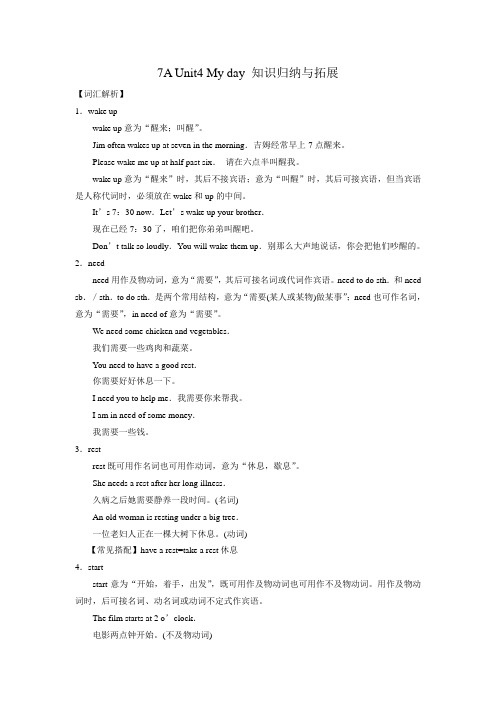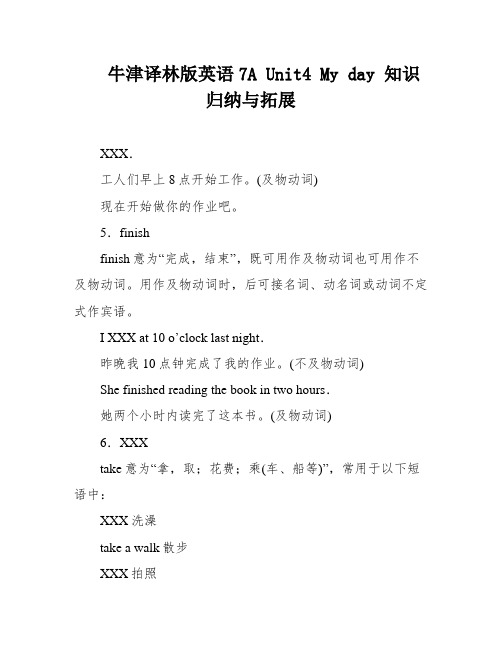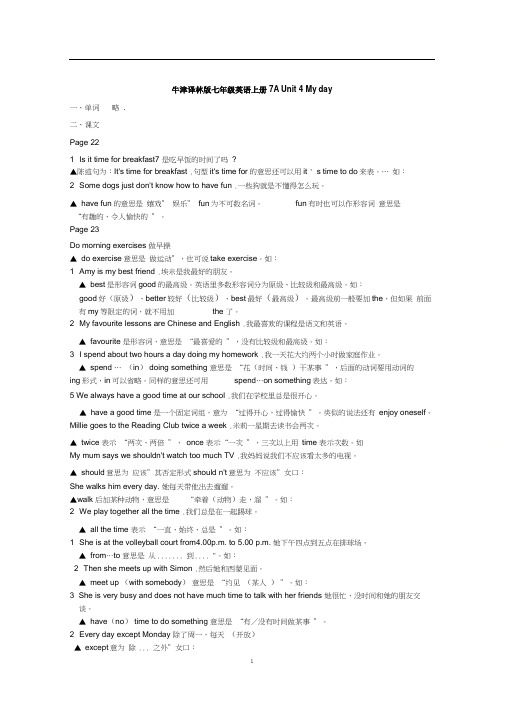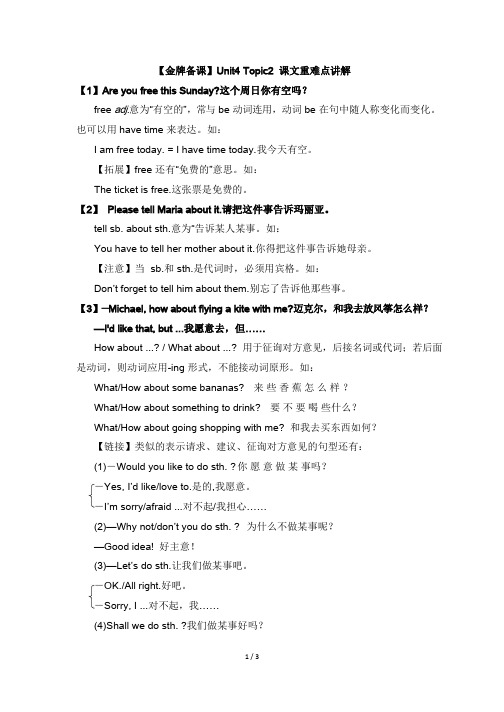7AUnit4语言点解析
牛津译林版英语7A Unit4 My day知识点归纳

7A Unit4 My day 知识归纳与拓展【词汇解析】1.wake upwake up意为“醒来;叫醒”。
Jim often wakes up at seven in the morning.吉姆经常早上7点醒来。
Please wake me up at half past six.请在六点半叫醒我。
wake up意为“醒来”时,其后不接宾语;意为“叫醒”时,其后可接宾语,但当宾语是人称代词时,必须放在wake和up的中间。
It’s 7:30 now.Let’s wake up your brother.现在已经7:30了,咱们把你弟弟叫醒吧。
Don’t talk so loudly.You will wake them up.别那么大声地说话,你会把他们吵醒的。
2.needneed用作及物动词,意为“需要”,其后可接名词或代词作宾语。
need to do sth.和need sb./sth.to do sth.是两个常用结构,意为“需要(某人或某物)做某事”;need也可作名词,意为“需要”,in need of意为“需要”。
We need some chicken and vegetables.我们需要一些鸡肉和蔬菜。
You need to have a good rest.你需要好好休息一下。
I need you to help me.我需要你来帮我。
I am in need of some money.我需要一些钱。
3.restrest既可用作名词也可用作动词,意为“休息,歇息”。
She needs a rest after her long illness.久病之后她需要静养一段时间。
(名词)An old woman is resting under a big tree.一位老妇人正在一棵大树下休息。
(动词)【常见搭配】have a rest=take a rest休息4.startstart意为“开始,着手,出发”,既可用作及物动词也可用作不及物动词。
Grade 7A unit4课文知识点

Unit4 Seasons1. like.....best= favourite 最喜爱的…E.g. I like summer best=My favourite season is summer.2. What about you? 你呢?What about…=how about…当他们后面接动词时候,要+ing.Eg: what about going for a walk?3. I never feel hot or cold. or 或者,否则and和,并且so所以,如此连词or用于否定句和疑问句and用于肯定句4. 常用后面连接动词ing的动词有:like, love, enjoy, finish, practice, mind+doing sth常用后面接动词原形的动词有:let, make,+do sth5.In spring,the weather starts to get warm.Start to do sth. Start doing sth.开始做某事get,become,turn“变得”的区别用法get 常用于口语,表示一种变化过程,常与形容词或比较级连用。
强调“渐渐变得”become 是个中性词,用于意义好、坏两方面的变化都可以,强调变化的过程已经完成,后面接名词或形容词。
turn后面多接表示颜色或天气的形容词,表示“变得与以前完全不同”6.It often rains. It 指代天气7.Everything turns green 不定代词作主语时,当第三人称单数使用.8.It is exciting to take a trip in spring.形容词Exciting(指物)& excited (指人)take a trip 旅行in spring 季节前零冠词9.Many people like to go to the beach and swim in the sea.Like to do 指想要去做某事,like doing指爱好,没有时间性。
上海英语 7A U4知识梳理

Unit 41.draw(三态) draw – drew – drawn2.邻居n. neighbour 小区n. neighbourhood3.build (三态) build-built-built 建筑工人n. builder4.搬v. move (n.) removal 在搬家那天on a removal day5.秘密n. secret 秘书n. secretary pl. secretaries6.建造v. construct n. construction7.good (adj.) / well (adv.) (比较级、最高级)– better – bestlittle -less-least8.和......一样the same … as 和......一样大the same age as = as old as9.一件家具 a piece of furniture (un.)10.在一家医院里工作work in a hospital 为一家搬家公司工作work for a removal companywork (un.) 一份工作a piece of work = a job11.使病人好转make sick people better使某人做某事make sb do sth一位病人a sick person = a patient 生病be/get sick/ill12.打信type letters 打字员n. typist scientist art ist13.wear(三态)wear– wore – worn 他正穿着一件红色大衣He is wearing a red coat.把那件红色大衣穿上。
Put on the red coat.14.drive(三态) drive – drove – driven15.快速(adj.) quick – (adv.) quickly (adj.) fast – (adv.) fast16.营救rescue = save从危险中拯救人们rescue/ save people from danger = keep people safe from danger17.投递/传送v. deliver n. delivery delivery truck 送信件和包裹deliver letters and parcels to sb18.一件制服a uniform19.一辆救护车an ambulance20.在上班be at work21.meet(三态) meet-met–met22.管理v. manage n. management 成功做某事manage to do sth 经理n. work as a manager23.接电话answer the phone24.参加会议go to meetings = attend meetings25.自行车(V. / n.) cycle 摩托车n. motorcycle 骑摩托车的人n. motorcycliste(三态) come-came– come27.向, 朝prep. towards = to28.catch (三态) catch-caught – caught29.run (三态) run – ran– run30.立刻的(adj.) immediate--- (adv.)immediat e ly = at once =right away31.break(三态) break – broke – broken 骨折的腿a broken leg32.carry(三态) carry – carried – carried33.发动机n. engine 工程师n. engineer34.撞到某人knock sb. down35.受伤be/get hurt 昨晚我的眼睛很痛My eyes hurt last night.36.让某人不要做某事let sb not do sth37.两天后two days late r38.empty v. 倒空(三态)empty-emptied-emptied(三单) empties39.烘烤v. bake 面包店– bakery 面包师– baker40.sell(三态) sell – sold – sold 把某物卖给某人sell sth. to sb.n. sale41.buy (三态)buy-bought – bought 为某人买某物buy sth. for sb.= buy sb. sth.42.在某人去某地的路上on one’s way to sp.在某人回家的路上on one’s way home43.sweep (三态) sweep-swept-swept44.收集v.collect n. collection 收藏家n. collector。
7A Unit4语言点归纳

7A Unit4 重点词组、难点解析、语法复习【词组总汇】Comic strip &Welcome to the unit1.wake up 醒醒P.422.go walking in the hills 在山间散步P.423.after breakfast/lunch 早餐/午饭过后P.424.have breakfast/lunch 吃早饭/午饭P.425.need a good rest 需要好好休息P.426.how to have fun 如何享乐P.427.a day at school 在校的一天P.438.get up 起床P.439.do morning exercises 做早操P.4310.have lessons 上课P.4311.do after-school activities 进行课外活动P.4312.watch TV 看电视P.4313.do homework 做家庭作业P.4314.be late for school 上学迟到P.4315.at a quarter past eight 在八点一刻P.43Reading1.school life 学校生活P.442.write to her online friend 写信给她的网友P.443.a student at Sunshine Middle School 阳光中学的一名学生P.444.from Monday to Friday 从星期一到星期五P.445.my favourite subject 我最喜欢的学科P.446.a lot of friends 许多朋友P.447.chat with each other 互相聊天P.448.play in the playground 在操场上玩P.449.go to the library 去图书馆P.4410.read books there on Tuesday and Thursday 周二和周四在那儿读书P.4411.in the school volleyball team 在校排球队P.4412.on Wednesday afternoon 在星期三下午P.4413.have a good time 玩得愉快P.4414.Best wishes 最美好的祝愿P.44Grammar1.plant trees 植树P.472.in March 在三月份P.473.in winter 在冬天P.474.in 2022 在2022年P.475.our summer holiday 我们的暑假P.476.have lots of fun 玩得开心P.477.on Children’s Day 在儿童节P.478.at six years old 在六岁时P.479.Thanks for your email. 谢谢你的邮件。
牛津译林版英语7A Unit4 My day 知识归纳与拓展

牛津译林版英语7A Unit4 My day 知识归纳与拓展XXX.工人们早上8点开始工作。
(及物动词)现在开始做你的作业吧。
5.finishfinish意为“完成,结束”,既可用作及物动词也可用作不及物动词。
用作及物动词时,后可接名词、动名词或动词不定式作宾语。
I XXX at 10 o’clock last night.昨晚我10点钟完成了我的作业。
(不及物动词)She finished reading the book in two hours.她两个小时内读完了这本书。
(及物动词)6.XXXtake意为“拿,取;花费;乘(车、船等)”,常用于以下短语中:XXX洗澡take a walk散步XXX拍照take a bus乘公共汽车XXX乘出租车XXX慢慢来,不着急take care of照顾,照料XXX off起飞,脱下take on雇用,承担XXX out取出,带出去XXX part in参加7.get upget up意为“起床”,是不及物动词短语。
I usually get up at six in the morning.我通常早上6点钟起床。
语法点拨】1.动词不定式作目的状语动词不定式作目的状语时,常用to do XXX的形式,表示某个动作的目的或意图。
He went to the shop to buy some food.他去商店买些食物。
I went to the library to XXX.我去图书馆借书。
2.时间状语从句时间状语从句是指在主句中表示时间的从句,常用的引导词有when,while,as,before,after,since,until等。
I will call you when I arrive in Beijing.我到北京后会给你打电话。
She was reading a book while her mother was cooking dinner.她妈妈在做饭时,她在看书。
牛津译林版七年级英语上册7A Unit4单元知识点总结

牛津译林版七年级英语上册7A Unit 4 My day一、单词略.二、课文Page 221 Is it time for breakfast7 是吃早饭的时间了吗?▲陈述句为:It's time for breakfast .句型it's time for的意思还可以用it ' s time to do来表。
… 如:2 Some dogs just don't know how to have fun .一些狗就是不懂得怎么玩。
▲have fun的意思是嬉戏” 娱乐” fun为不可数名词。
fun有时也可以作形容词意思是“有趣的,令人愉快的”。
Page 23Do morning exercises 做早操▲do exercise意思是做运动”,也可说take exercise。
如:1 Amy is my best friend .埃米是我最好的朋友。
▲best是形容词good的最高级。
英语里多数形容词分为原级、比较级和最高级。
如:good好(原级)、better较好(比较级)、best最好(最高级)。
最高级前一般要加the,但如果前面有my等限定的词,就不用加the 了。
2 My favourite lessons are Chinese and English .我最喜欢的课程是语文和英语。
▲favourite 是形容词,意思是“最喜爱的”,没有比较级和最高级。
如:3 I spend about two hours a day doing my homework .我一天花大约两个小时做家庭作业。
▲spend … (in) doing something 意思是“花(时间、钱)干某事”,后面的动词要用动词的ing形式,in可以省略。
同样的意思还可用spend…on something表达。
如:5 We always have a good time at our school .我们在学校里总是很开心。
牛津译林版七年级英语上册7A Unit4 知识点与语法点讲解与分析

牛津译林版七年级英语上册7Aunit4知识点与语法点讲解与分析知识点:1 wake up 当接代词作宾语时,代词放在中间,接名词可放后面或中间,类似词组pick up/try on/put on/take of/turn on/turn dow n2 It is time for +sth /doing sth ---- 是----- 的时候了” = It is time to do sth.【拓展】It ' s time for sb to do到某人做某事的时间了eg: It ' s time for you to do your homework— It ' s time for doing your homework.3 sleep/go to sleep/go to bed/ 区另U4 how to have fun是特殊疑问词+动词不定式"构成的不定式短语;have fun=have agood/great/wo nderful time=enjoy on eself 过得愉快"” fun 为不可数名词。
5 watch/look/see/read 区另U6 write to sb给某人写信”7 be nice to sb对某人友好”类似结构:be frie ndly to sb 对某人友好be polite to sb 对某人礼貌8 first adj/adv &n 第一,首先,最初Eg Sun day is the first day of the week.I get back home after school and I do my homework first.【注】first为序数词,前面应加定冠词the。
但序数词作定语且前面有形容词性物主代词等修饰时,不带the。
This is our first less on.固定搭配:at first起先first of all 首先【拓展】firstly adv首先,第一9. once adv 一次;一度Once用作副词,表示一次,具有数量之意,与某一特定范围连用表示频率。
仁爱版英语七年级上册7A_unit4_topic2_课文重难点讲解(含答案)

【金牌备课】Unit4 Topic2 课文重难点讲解【1】Are you free this Sunday?这个周日你有空吗?free adj.意为“有空的”,常与be 动词连用,动词be 在句中随人称变化而变化。
也可以用have time 来表达。
如:I am free today. = I have time today.我今天有空。
【拓展】free 还有“免费的”意思。
如:The ticket is free.这张票是免费的。
【2】Please tell Maria about it.请把这件事告诉玛丽亚。
tell sb. about sth.意为“告诉某人某事。
如:You have to tell her mother about it.你得把这件事告诉她母亲。
【注意】当sb.和sth.是代词时,必须用宾格。
如:Don’t forget to tell him about them.别忘了告诉他那些事。
【3】-Michael, how about flying a kite with me?迈克尔,和我去放风筝怎么样?—I'd like that, but ...我愿意去,但……How about ...? / What about ...? 用于征询对方意见,后接名词或代词;若后面是动词,则动词应用-ing 形式,不能接动词原形。
如:What/How about some bananas? 来些香蕉怎么样?What/How about something to drink? 要不要喝些什么?What/How about going shopping with me? 和我去买东西如何?【链接】类似的表示请求、建议、征询对方意见的句型还有:(1)-Would you like to do sth. ?你愿意做某事吗?-Yes, I’d like/love to.是的,我愿意。
-I’m sorry/afraid ...对不起/我担心……(2)—Why not/don’t you do sth. ? 为什么不做某事呢?—Good idea! 好主意!(3)—Let’s do sth.让我们做某事吧。
- 1、下载文档前请自行甄别文档内容的完整性,平台不提供额外的编辑、内容补充、找答案等附加服务。
- 2、"仅部分预览"的文档,不可在线预览部分如存在完整性等问题,可反馈申请退款(可完整预览的文档不适用该条件!)。
- 3、如文档侵犯您的权益,请联系客服反馈,我们会尽快为您处理(人工客服工作时间:9:00-18:30)。
Unit41.wake (sb.) up叫醒某人(其中sb用宾格)2.It’s time for sth./ It’s time to do sth./ It’s time for sb. to do sth.该某人做某事啦。
注意它的一般疑问句Is it time to do sth.?3.Shall we 加动原…?= What /How about doing sth.?= Why not do sth.?我们做某事,好吗?为什么不做某事呢?4.go walking 去散步go out for a walk出去散步5.in the hills在山里6.seldom/ never/ hardly都是否定词7.after lunch午餐后at lunchtime在午餐时间8.need a good rest需要好好休息need sth.需要某物need to do sth.需要做某事need sb. to do sth.需要某人做某事9.do morning/eye exercises做早/眼保健操do after-school activities 做课外活动10.be late for 迟到注意区分Jack is always late for school.和Jack, don’t be late for school again.11.start lessons开始上课We start lessons at a quarter past eight.=Our lessons begin at a quarterpast eight.12.a student at Huji Middle School13.from Monday to Wednesday14.a lot of=lots of既可以修饰可数也可以修饰不可数15.be all nice to sb. 都对某人好16.chat with each other互相聊天(注意chatting)17.have a Reading/ Swimming/ Dancing Club18.read books there/ go there by bus/ take the bus there/ walk there/ go there on foot/ ride abike there/ go there on one’s bike/ on No. 5 bus在五路公共汽车上19.in the school volleyball team20.practice doing sth.练习做某事21.have (great) fun doing sth.= have a good time doing sth.= enjoy oneself(myself/ ourselves/yourself/ yourselves/ himself/ herself/ themselves/ itself) 玩得开心22.all the best/ best wishes23.He is the best student in my class.24.in1999/in January (February/March/April/May/June/July/August/September/October/November/December)/ in spring(summer/ autumn/ winter)/25.on a …morning/ on the morning of…/on Sunday( Monday/ Tuesday/ Wednesday/ Thursday/Friday/ Saturday)/on Childre n’s Day/26.at noon/ at breakfast/at 6 years old/at lunchtime/at birth/at Christmas/ at the daytime27.We don’t have lessons on Saturday or Sunday.28.have much time to do sth.有许多时间做某事have no time to do sth.没有时间做某事29.have too much homework to do有太多的作业要做30.dance for two hours跳舞两个小时(记住在一段时间前用for)。
对for +一段时间提问用how long./ 对in +一段时间提问用how soon/ 对距离提问用how far/对频率提问用how often31.at Sunshine Sports Center在阳光体育中心32.the two teams in the match比赛中的两个队e and watch the game 或come to watch the game来观看比赛34.Thanks for doing sth./Thanks for sth.如Thanks for your help.35.wish your team good luck/ Good luck to you./ a lucky dog幸运儿36.like to do sth.37.visit the museums38.go on picnics= go on a picnic39.对once a month/ twice a month/ three times a month提问用how often,但是对其中的once, twice,three提问用how many times40.bread, food, chalk是不可数名词41.be/ get ready for 为…准备好42.What’s the weather like?= How is the weather?43.It’s good for sb. to do sth.做某事对某人有好处44.the reason for……的原因45.learn from sb.向某人学习learn to do sth.学习做某事learn a lot about …了解…46.too much homework(too much 后接不可数名词)、eat too much/Don’t talk too much.(too much放在动词后)much too cold太冷(much too 后接形容词)too many people太多的人(too many 后接可数名词复数)47.put on 穿上,上演put out扑灭put up 挂上,张贴put off延期put away把…收起来48.careful形容词“细心的”carefully副词“细心”be careful/ listen to the teachers carefully49.take good care of = look after…well很好地照顾某人50.remember to do sth.记得要去做某事(事情没有做)remember doing sth.记得做过某事(事情已经做了)51.finish doing sth. 做完某事52.Must I …?的否定回答No, you needn’t./ No, you don’t have to.Unit51.聚会,联欢get together2.月饼moon cake3.敲门knock on/at the/people’s door4.不招待,就使坏trick or treat5.粽子rice dumplings/a rice dumpling6.狮子舞the lion dance7.发现find out8.拍照take a photo/take photos9.在夜里at night10.放烟火let off fireworks11.红包a red packet/res packets12.让某人做某事let sb do sth let 后面加动词原形13.让我们let us=let’s14.猜一猜have a guess15.想要做某事(2)want to do sth=would like todo sth16.装扮成dress up as dress up 打扮bedressed in 穿着dress sb.给某人穿衣服17.……怎么样?及用法what about…?=howabout…? 后面人称代词用宾格,动词用ing形式18.美猴王the Monkey King19.春节(2)Chinese New Year=Spring Festival20.端午节Dragon Boat Festival21.庆祝中秋节celebrate Mid-Autumn Festival22.在感恩节on Thanksgiving Day23.得到许多礼物get lots of/a lot of/manypresents24.在圣诞节at Christmas25.在那一天on that day26.我所有的家人all my family27.吃一顿丰盛的大餐have a big dinner28.赏满月enjoy the full moon be full of装满…… 充满……29.居住在美国(3)live in the USA/theUS/America30.看信read a letter/letters31.因某事感谢某人thank sb for sth32.因做某事感谢某人thank sb for doing sth33.谢谢你(2)thank you=thanks34.告诉某人关于某事tell sb about sth35.最喜欢(2)sb’s favourite=like …best36.在10月31日的晚上on the evening ofOctober 3137.过得很开心have lots of fun38.戴面具wear masks/a mask39.给某人穿衣dress sb40.用颜料涂脸paint faces41.做南瓜灯make pumpkin lanterns42.玩游戏play a game/games43.给我们一些糖果作为一次招待give us somecandy as a treat44.给某人某物(2)give sb sth=give sth to sb45.捉弄某人play a trick/tricks on sb46.举行一个派对have a party47.在几月几日的晚上on the evening of+几月几日48.享受美食和饮料enjoy nice food and drinks49.特殊的一天 a special day50.对孩子们来说for children51.用A作B make B out of A A是制成品B是原材料52.在万圣节(Halloween)on Halloween53.到达学校get to school 到家get home54.到这儿、那儿get here/there (homehere there 为地点副词,前面不需要介词55.中饭吃…… have…for lunch56.想要某物(2)want sth=would like sth57.圣诞节想要…… want…for Christmas58.在一楼(2)on the ground floor/on the firstfloor59.一个玩具火车 a toy train60.家庭成员family members61.外出去吃生日餐go out for a birthdaydinner62.我明白了I see63.一些其他的东西some other things64.年夜饭Chinese dinner65.在广播中on the radio66.在度假be on holiday67.在派对上at the party68.新年快乐!及答句Happy New Year! 答句:Happy New Year!或The same to you!69.看烟花watch the fireworks70.在那之后after that71.举行关于不同节日的演出have shows aboutdifferent festivals72.全世界around the world/all over theword73.在学校礼堂at the school hall74.一个重要的节日an important holiday75.大多数的中国家庭most Chinese families76.放烟花set/let off fireworks77.春节联欢晚会the Spring Festival Gala78.在一年中的这个时候at this time of year79.在电视上on TV80.为……做准备get ready for…81.为A 准备B get A ready for B82.每年every year (every前不用介词)例题解析1.This is our ___first___________ (one)day at No.1 Middle Schoo1.【与one有关的词有两个,first和once.】2.Does Daniel like____reading__________ (read)books?【like doing sth.】3.My ______________ (hobby)are football and volleyball【后面有are,所以前面用hobby的复数,以辅音字母加y结尾的改y为i加es】.4.After school,Daniel usually______________(play)with his friends.【主语是Daniel,属于第三人称单数,所以动词用单三,plays】5.I’m free today.What about _________________(go)to the park?【what about doing sth.】6.Do you often watch tennis _____________(match)with your father?【可数名词前面没有冠词a,an,the时,后面用复数。
